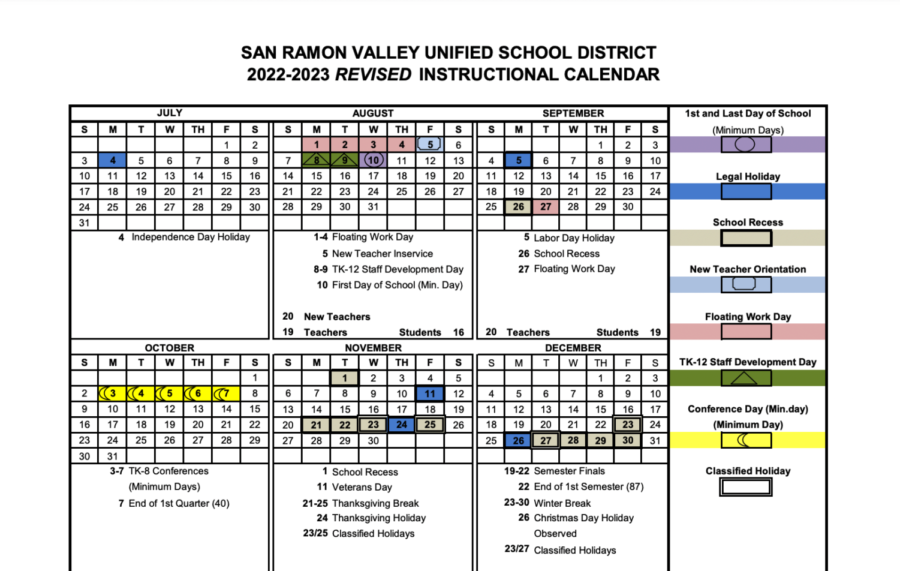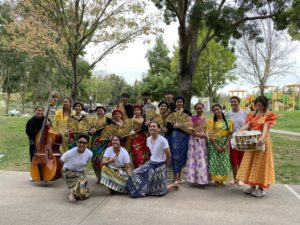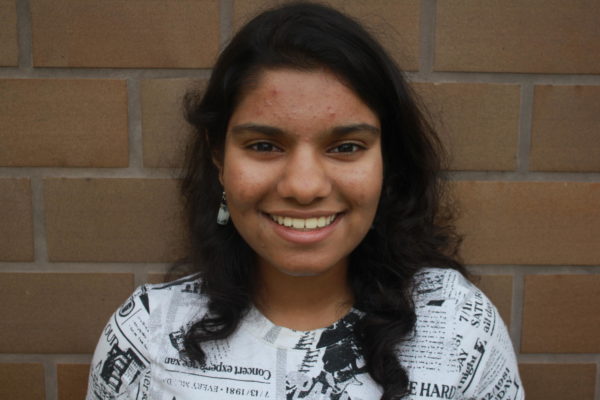‘Tis the season to be jolly (lest you celebrate Eid or Diwali)
San Ramon Valley Unified School District
Throughout American history, Christianity has always been the dominating religion, and our school year calendar reflects that. However, as our country becomes more diverse, especially religiously, a Christian-centric yearly schedule harms students of other faiths.
December 13, 2022
After a long, tiring first semester, winter break is all anyone seems to be able to talk about. Not only is the two and a half weeks off from school appealing, students are also looking forward to the holidays they bring with them: New Year’s and of course, Christmas.
In fact, all three long breaks throughout the year have holidays attached to them. In the fall, we get a week off for Thanksgiving, and Spring Break occurs before or after Easter Sunday.
But even though these holidays are widely celebrated, they only cater to one religion: Christianity. For many students at DVHS, Diwali might be the most exciting part of the year. For others, Eid is the highlight of spring and fall.
Where are the week-long vacations for these holidays? Why aren’t these important religious dates accommodated by the school calendar like Christian ones are?
Throughout American history, Christianity has always been the dominating religion, and our school year calendar reflects that. However, as our country becomes more diverse, especially religiously, a Christian-centric yearly schedule harms students of other faiths.
One of these students, Scheherazade Ali, is Muslim. For many Muslims, Eid is a significant religious festival. It signifies the end of Ramadan, a month long period, where Muslims fast during the day.
“We hang out and talk as a big family, reconnect with everybody, because the main purpose of the Holiday is to appreciate your family,” Ali said. “It’s a special day for me and for my mom, so how could I just spend half of it at school?”
In 2021, Eid al-Fitr started on Wednesday, May 12. Ali chose to skip school, only to face disastrous consequences.
“All of the P.E classes were signing up for the P.E Olympics. Since I wasn’t there, my wonderful team took the liberty of signing me up for the mile and the 40 meter dash,” Ali said.
Just like Eid, many other religious holidays occurred on a weekday this year. Diwali happened on a Monday, Oct. 24. Eid al-Adha, which is the second large holiday celebrated by the Muslim community, was on a Friday.
Is it fair to non-Christian students that only Christmas and Easter have entire weeks dedicated to them, while other holidays aren’t even recognized? Ali thinks it isn’t.
“Some students prioritize their education [over their religion] because they have to. They might have a test on that day. Overall, the lack of accommodations forces students to choose between their religion and their grades,” Ali said. “I feel like a lot of [religious] students would benefit from having at least one day off.”
Though Ali finds that non-Christian holidays should be implemented into school calendars, many argue that these measures would be too drastic, and benefit few people.
Studies show that only 9% of Californians practice non-Christian religions. To some, going through the trouble to alter school calendars, which would be a district wide change, seems extreme to accommodate a small percentage of people.
This is the sort of thinking that alienates minority religions. No student should have to choose between their education and their religion because they’re a minority, but that’s exactly what non-Christians are forced to do.
What’s more, Christianity, the “majority religion,” soon may no longer be the majority religion. Due to immigration and religious switching, the Christian religion may shrink to just above 50% by 2050 and continue shrinking from there onwards. In contrast, people unaffiliated with religion and people following other religions will see an increase. Once the statistics change, a Christianity-centric school calendar will become increasingly obsolete.
What’s more, the calendar itself doesn’t have to change. There are many accommodations that would greatly benefit non-Christian students celebrating religious days. Asking teachers to upload an agenda on these days, or creating home-study packets would keep religious students in the loop. Even a simple reminder to teachers against conducting tests or starting important projects on religious holidays could curtail situations like Ali’s.
With so many options available to us, why are we not taking action? Why haven’t we making something as basic as the school calendar accessible to students of all religions?
Some states already have. Starting in 2023, Diwali will be recognized as a school holiday in New York City. Parts of Pennsylvania have even implemented this holiday into their calendar.
As the ninth state with the most Muslims, and the second with the most Hindus, California is the perfect place to adopt these new religious school policies. Every student from every religion deserves to have their faith acknowledged and an equal level of education as the others.





